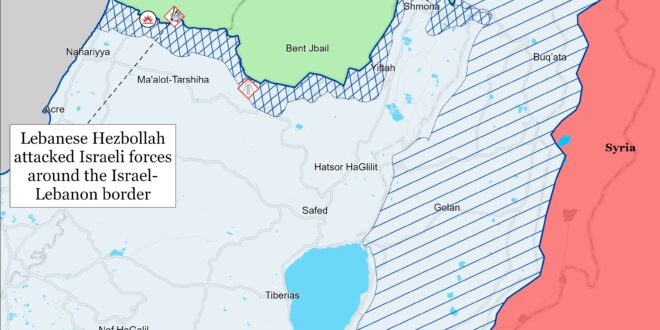Israeli officials have emphasized the need to respond to the Iranian drone and missile attack but have not specified how or when they will do so.[i] An unnamed US official told Axios that Israeli Defense Minister Yoav Gallant told US Defense Secretary Lloyd Austin in a phone call on April 15 that Israel has ”no choice” but to respond to the Iranian attack.[ii] Gallant stated that Israel will not allow ballistic missiles to be launched against its territory without a response. An unnamed Israeli official told NBC News that Israel’s response may be ”imminent” following an Israeli war cabinet meeting on April 15. The official added that any Israeli response will be coordinated with the United States.[iii]
Western and Israeli officials have maintained that the Iranian drone and missile attack into Israel on April 13 was meant to impose a severe cost on Israel—rather than the attack being symbolic and meant to fail.[iv] US National Security Council spokesperson John Kirby stated on April 15 that Iran sought to cause “extensive damage inside Israel” but failed due to US, Israeli, and partner efforts to intercept the Iranian projectiles.[v] Kirby’s remarks are consistent with other unnamed senior Biden administration officials telling Western media that Iran intended for the attack to cause ”significant damage” and be ”highly destructive.”[vi] Israel Defense Forces (IDF) Chief of Staff Lt. Gen. Herzi Halevi similarly emphasized that Iran intended to harm the “strategic capabilities” of Israel but was unsuccessful during a statement at IDF Nevatim airbase on April 15.[vii]
These statements from Western and Israeli officials are consistent with CTP-ISW’s assessment that the Iranian drone and missile attack was meant to penetrate Israeli air defenses and enable missile impacts inside Israel, thus causing greater damage than the attack actually did. The attack was designed to succeed—not to fail. The strike package was modeled on those that Russia has used repeatedly against Ukraine to great effect.[viii]
Three unnamed US officials told the Wall Street Journal on April 14 that roughly 50 percent of the ballistic missiles that Iran fired at Israel either failed to launch or crashed before reaching their target.[ix] US officials stated that Iran launched between 115 and 130 ballistic missiles at Israel in its attack.
Key Takeaways:
- Iran: Israeli officials have emphasized the need to respond to the Iranian drone and missile attack but have not specified how or when they will do so.
- Western and Israeli officials have maintained that the Iranian drone and missile attack into Israel was meant to impose a severe cost on Israel.
- Three unnamed US officials stated that roughly 50 percent of the ballistic missiles that Iran fired at Israel either failed to launch or crashed before reaching their target.
- Gaza Strip: Hamas demanded several new concessions from Israel in its counteroffer to the US-proposed ceasefire agreement.
- West Bank: Israeli settlers conducted a shooting attack and killed two Palestinians in Aqraba, which is near Nablus.
- Southern Lebanon and Golan Heights: Lebanese Hezbollah has conducted at least six attacks around the Israel-Lebanon border.
- Iraq: Iraqi Prime Minister Mohammad Shia al Sudani traveled to Washington, DC, to discuss bilateral US-Iraqi relations.
- Yemen: US CENTCOM stated that the Houthis launched an anti-ship ballistic missile toward the Gulf of Aden but did not damage any vessels.
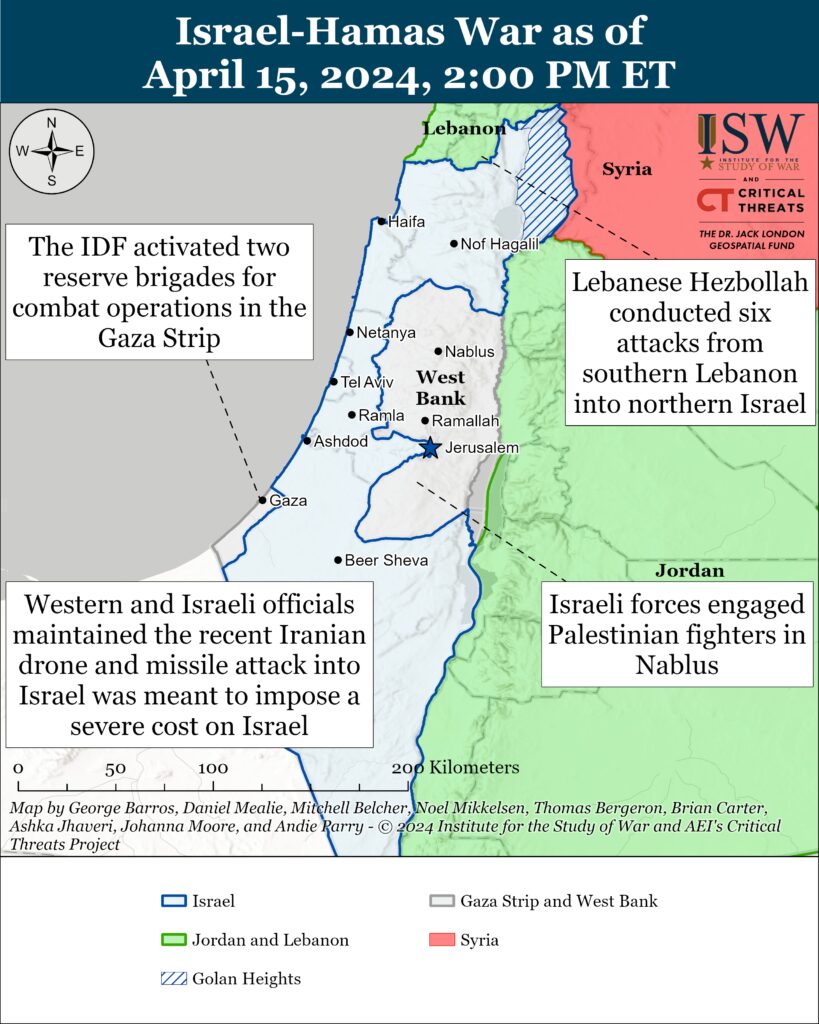
Gaza Strip
Axis of Resistance objectives:
Erode the will of the Israeli political establishment and public to sustain clearing operations in the Gaza Strip
Reestablish Hamas as the governing authority in the Gaza StripThe IDF Nahal Brigade continued to conduct clearing operations at the seam of the northern and central Gaza Strip on April 15 to secure Israeli-built highway Route 749 and other nearby Israeli military sites.[x] The IDF has dubbed this zone the Netzarim corridor. The Nahal Brigade killed 15 Palestinian fighters around the corridor over the past day.[xi]
The IDF activated two reserve brigades on April 14 for combat operations in the Gaza Strip.[xii] An Israeli Army Radio journalist reported on April 15 that the IDF 2nd Carmeli Brigade and 679th Armored Brigade will deploy to secure the Netzarim corridor and the temporary US-built pier in the central Gaza Strip.[xiii] The two brigades will replace elements of the 162nd Division in the Gaza Strip, enabling the division to conduct raids in other parts of the Gaza Strip.[xiv]
Israeli forces continued to conduct raids around Nuseirat in the central Gaza Strip on April 15.[xv] Elements of the IDF 162nd Division, including the Nahal and 401st brigades, are operating in the area to kill Palestinian fighters and destroy military infrastructure.[xvi] The IDF Nahal Brigade destroyed buildings and military infrastructure used by Hamas and Palestinian Islamic Jihad (PIJ) in the central Gaza Strip. The brigade also directed airstrikes targeting Palestinian fighters and seized weapons. PIJ mortared an IDF headquarters near the University of Palestine, north of Wadi Gaza, on April 14.[xvii]
Three Palestinian militias targeted Israeli forces in eastern Jabalia in the northern Gaza Strip on April 15. Israeli forces continue to operate there, along the Israel-Gaza Strip border, to clear a one-kilometer buffer zone. The al Aqsa Martyrs’ Brigades, which is the self-proclaimed military wing of Fatah, reported that its fighters mortared Israeli armor east of Jabalia cemetery.[xviii] PIJ and the Palestinian Mujahedeen movement posted videos of their fighters targeting Israeli forces with heavy mounted machine guns in eastern Jabalia on April 15.[xix] CTP-ISW cannot verify when the groups recorded the footage.
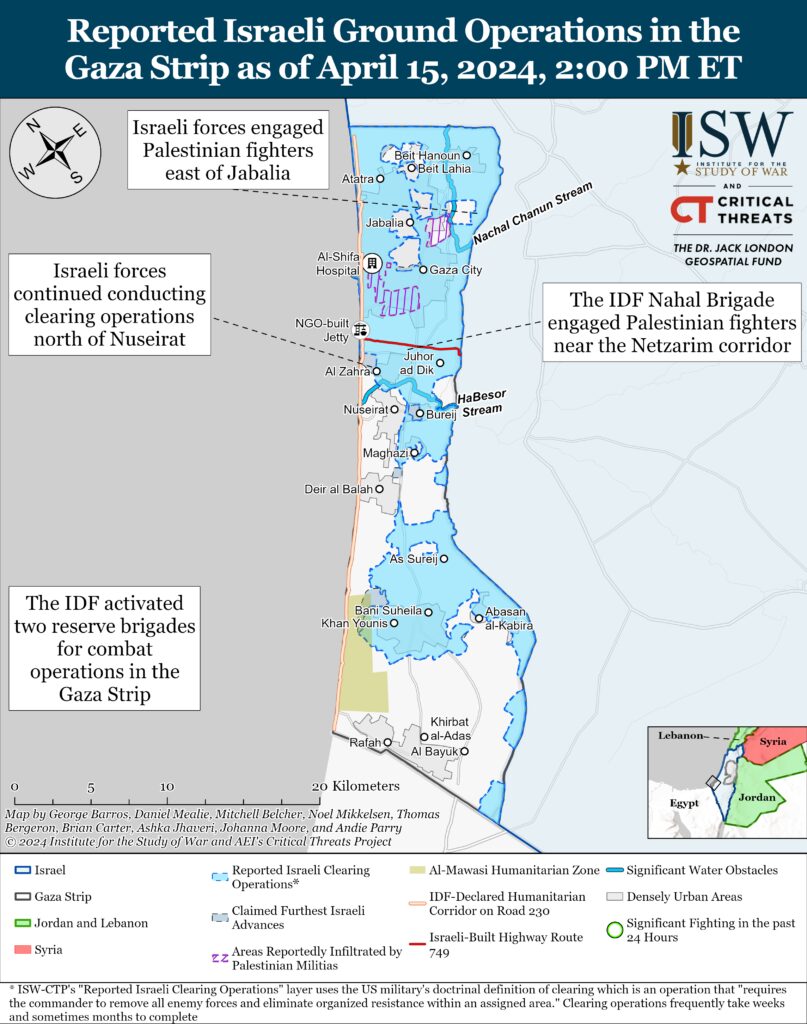
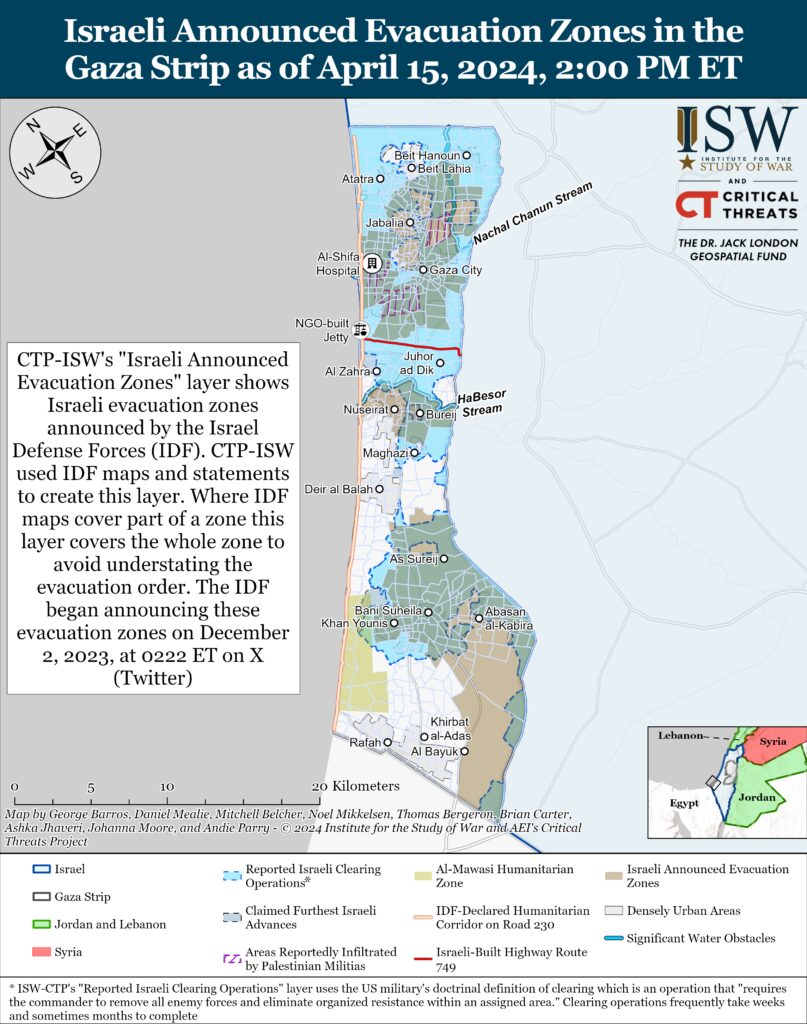
The IDF Arabic-language spokesperson reiterated on April 15 that Palestinians cannot return to the northern Gaza Strip, calling the area “a dangerous combat zone.”[xx] The IDF asked Gazans to remain in humanitarian zones and shelters in the southern Gaza Strip.[xxi] The statement marks the spokesperson’s second such appeal in two days, indicating that migration to the north remains a problem for the IDF.[xxii]Hamas has made the return of Gazans to the north a consistent demand in the ceasefire negotiations.[xxiii]
Israeli Defense Minister Yoav Gallant held a meeting on April 15 to identify “necessary civilian operations” to accomplish before an IDF clearing operation into Rafah. The minister focused on the need to evacuate civilians from Rafah and increase food and medical supply transfers into the Gaza Strip.[xxiv] Israeli Prime Minister Benjamin Netanyahu said on April 8 that he had set a date for the clearing operation into Rafah.[xxv]
Hamas demanded several new concessions from Israel in its counteroffer to the US-proposed ceasefire agreement, according to one Israeli official.[xxvi] Hamas rejected the US-proposed ceasefire and hostage-for-prisoner exchange deal on April 13 hours before the Iranian drone and missile attack on Israel.[xxvii] The Israeli source claimed that Hamas sought to release only 20 Israeli hostages for a six-week ceasefire—half of the hostages reportedly proposed by the United States.[xxviii] Hamas also reportedly asked for a higher ratio of hostage-for-prisoners and for more life-sentenced Palestinian prisoners to be released.[xxix] A recent Western report indicated that the US-proposal had a ratio of one Israel hostage for 17.5 Palestinian prisoners [xxx] White House spokesperson John Kirby said on April 15 that the United States believes that its proposal is still possible and that he is unaware of another proposal.”[xxxi]
Palestinian fighters did not conduct any indirect fire attacks from the Gaza Strip into Israel on April 15.
West Bank
Axis of Resistance objectives:
Establish the West Bank as a viable front against IsraelIsraeli forces engaged Palestinian fighters in Nablus on April 14 and 15.[xxxii] The al Aqsa Martyrs’ Brigades fired small arms and detonated IEDs targeting Israeli forces there.[xxxiii]
Israeli settlers conducted a shooting attack and killed two Palestinians in Aqraba, which is near Nablus, on April 15, according to Israeli media.[xxxiv] The IDF said that the attack followed a violent confrontation between a Jewish shepherd and Palestinian in the area.[xxxv] The IDF said that Israeli forces responded to the scene and tried to diffuse the conflict after the shooting.[xxxvi] The IDF and Israeli police are investigating the incident.[xxxvii] Israeli media has reported an uptick in settler attacks in the West Bank following the murder of an Israeli boy near the Malachi Hashalom settlement on April 12.[xxxviii]
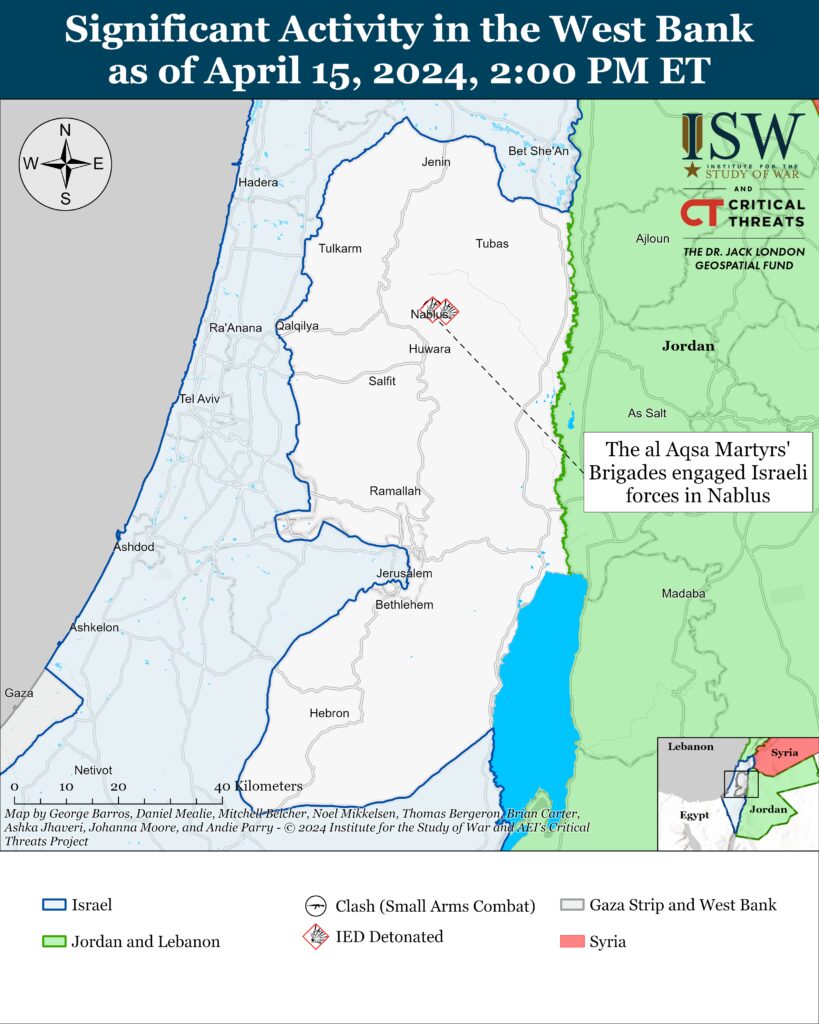
This map is not an exhaustive depiction of clashes and demonstrations in the West Bank.
Southern Lebanon and Golan Heights
Axis of Resistance objectives:
Deter Israel from conducting a ground operation into Lebanon
Prepare for an expanded and protracted conflict with Israel in the near term
Expel the United States from SyriaLebanese Hezbollah has conducted at least six attacks around the Israel-Lebanon border since CTP-ISW’s last data cutoff on April 14.[xxxix] The IDF said that an explosion injured four IDF soldiers in the ”border area” of northern Israel on April 15.[xl] Hezbollah said that it detonated ”explosive devices” targeting IDF members in Tal Ismail, Lebanon, as they crossed the border into Lebanon.[xli]
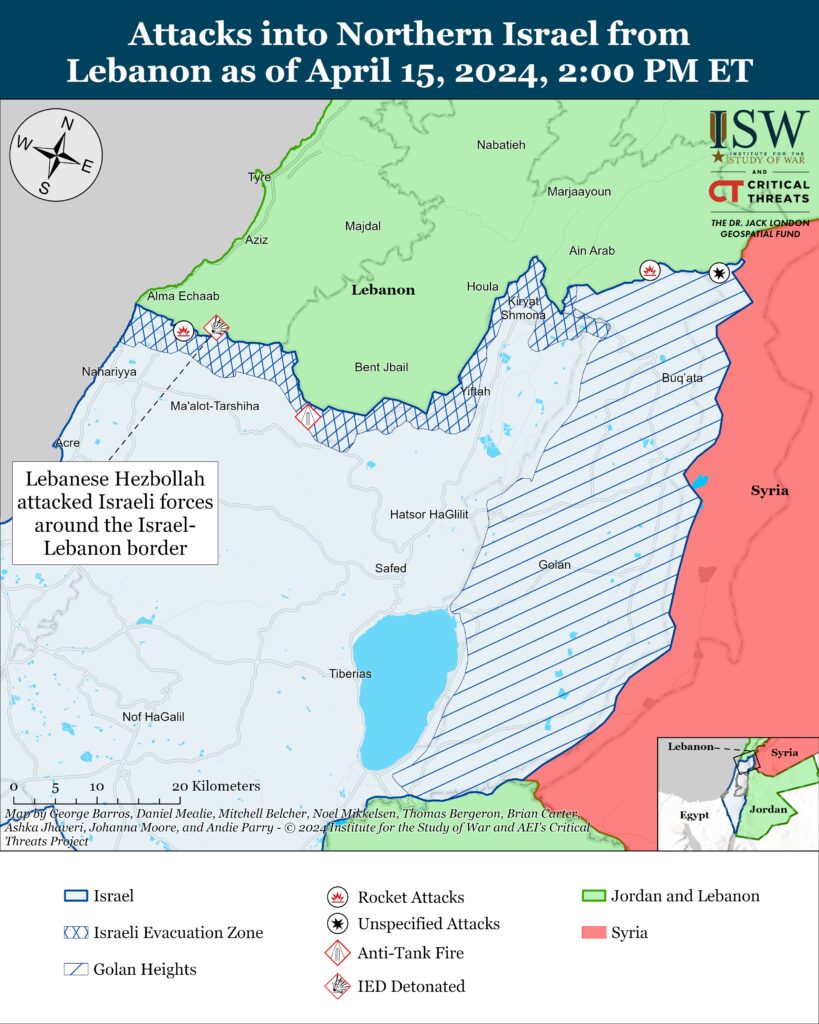
Recorded reports of attacks; CTP-ISW cannot independently verify impact.
Iran and Axis of Resistance
Iraqi Prime Minister Mohammad Shia al Sudani met with US President Joe Biden and Secretary of State Antony Blinken in Washington, DC, on April 15 to discuss bilateral US-Iraqi relations.[xlii] Sudani stated during his meeting with Biden that he aimed to discuss a “360-degree strategic partnership” and transition from a “military security-based relationship to a comprehensive economic, political, environmental, educational, and security partnership according to the Strategic Framework Agreement”.[xliii] CTP-ISW has previously assessed that Sudani is attempting to retain some US force presence in Iraq, but this policy places Sudani at odds with Iranian-backed groups which demand a full US withdrawal from Iraq.[xliv]
The Islamic Resistance in Iraq—a coalition of Iranian-backed Iraqi militias—threatened on April 12 to renew its attack campaign targeting US forces in Iraq if there is a bilateral agreement between the United States and Iraq that permits US forces to remain.[xlv]
Iranian-backed Iraqi militia Kataib Hezbollah congratulated Iran for its recent drone and missile attack on Israel and framed the attack as a success for penetrating Israeli air defense systems.[xlvi] Western media reported that four out of the 100+ ballistic missiles launched by Iran penetrated Israeli air defenses and hit an IDF airbase in southern Israel.[xlvii] Israeli media reported that the airbase suffered minimal damage.[xlviii] Kataib Hezbollah also said that “the shame would haunt the rulers of Jordan” for supporting the US and Israeli effort to intercept Iranian projectiles.[xlix]
The IDF announced the interception of two drones approaching Israel. The IDF Navy intercepted a drone approaching near Eilat from the Red Sea on April 14.[l] The IDF separately reported on April 15 that it intercepted a drone approaching Israeli territory “from the east.”[li] Neither Iran nor an Iranian-backed group have claimed either attack at the time of this writing.
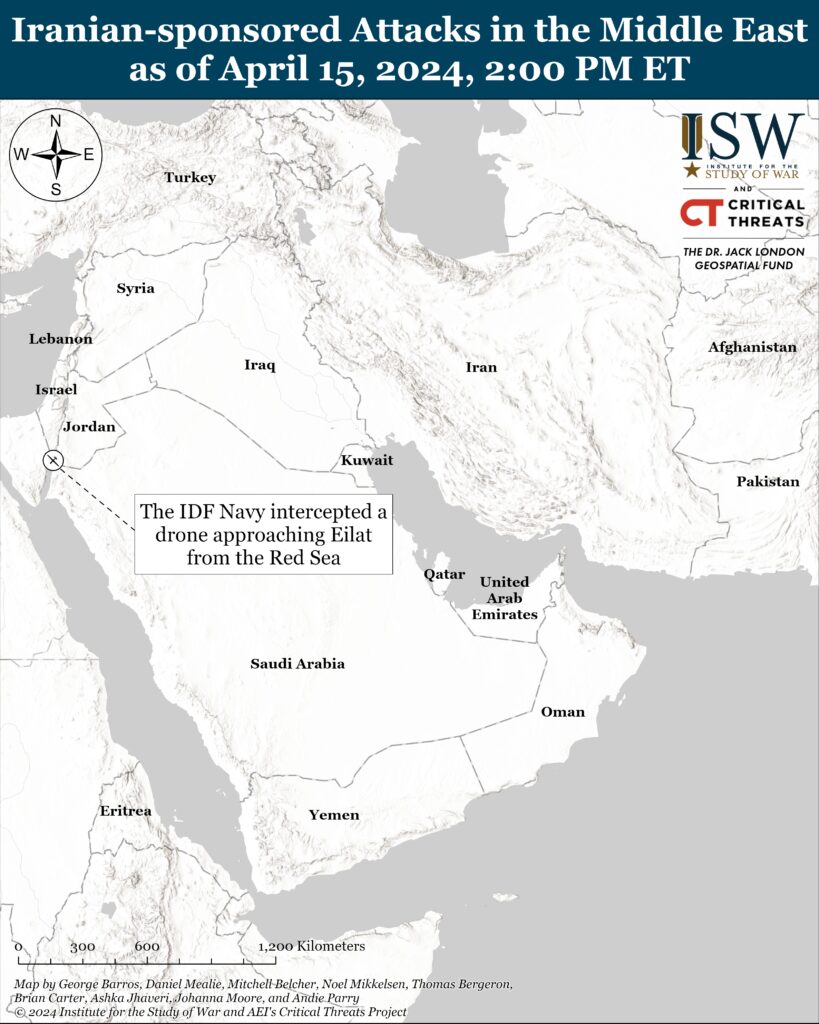
US CENTCOM stated that the Houthis launched an anti-ship ballistic missile toward the Gulf of Aden on April 13 but did not damage any vessels.[lii] US CENTCOM destroyed four Houthi drones in Taiz Governorate on April 14 following the Houthi anti-ship ballistic missile attack.[liii]
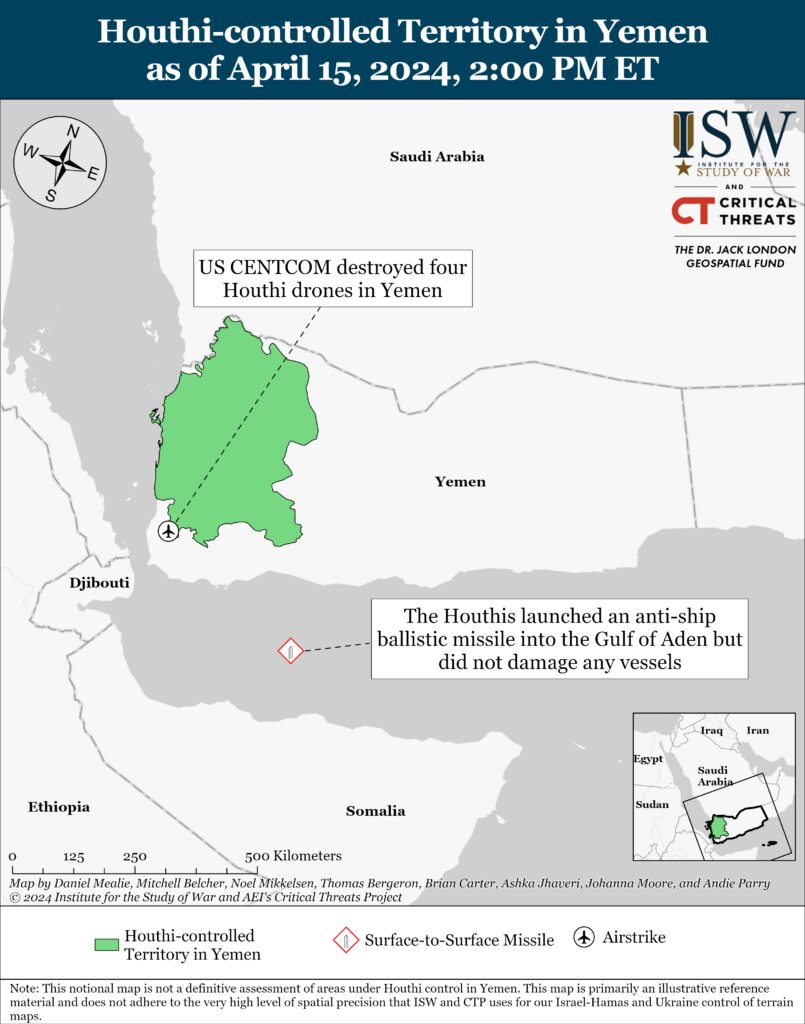
Iranian Foreign Affairs Minister Hossein Amir Abdollahian held phone calls with several of his foreign counterparts on April 14 and 15. Abdollahian spoke with the foreign ministers of Egypt, Qatar, Russia, Saudi Arabia, and the United Kingdom, among others. Abdollahian claimed that the recent Iranian drone and missile attack on Israel was “legitimate self-defense” under Article 51 on the UN charter.[liv] Abdollahian reiterated that, if Israel responds, the next Iranian attack would be “immediate, stronger, and more extensive.“[lv] The foreign ministers of Egypt, Germany, Qatar, Saudi Arabia, Slovenia, the Netherlands, and the United Kingdom separately emphasized the need for regional deescalation in their phone calls with Abdollahian.
The Iranian Law Enforcement Command (LEC) resumed enforcing mandatory veiling throughout Tehran on April 13. LEC Tehran Provincial Unit Commander Brig. Gen. Abbas Ali Mohammadian announced that his forces would begin penalizing unveiled women on April 13.[lvi] Iranian social media users have correspondingly reported a sharp uptick in morality and veiling enforcement throughout Tehran City since then.[lvii] This enforcement involves arrests, fines, and verbal warnings.[lviii] Some users have reported similar enforcement activity in other cities, such as Karaj, Mashhad, and Yazd.[lix] The Iranian regime reduced the number of morality patrols following the killing of Mahsa Amini in September 2022, although it did not entirely stop policing unveiled women in the months following her death.[lx] Iranian social media users additionally noted an increased security presence in some Tehran universities in recent days, with some female dormitories reportedly requiring facial recognition technology for entry.[lxi] The full resumption of enforcing modesty standards in Tehran follows Supreme Leader Ali Khamenei’s call for mandatory veiling on April 3.[lxii]
Resumed veiling enforcement could exacerbate already existing anti-regime sentiments in Iran, especially amid deteriorating economic conditions and the ongoing escalation with Israel. One reformist-affiliated Iranian outlet wrote that the LEC risked submerging the country into a “state of crisis” following the recent Iranian drone and missile attack on Israel and compared the increased security presence in Tehran to an “invasion.”[lxiii]
The Iranian rial separately reached a record low of 670,500 to one US dollar on April 12.
 Eurasia Press & News
Eurasia Press & News
